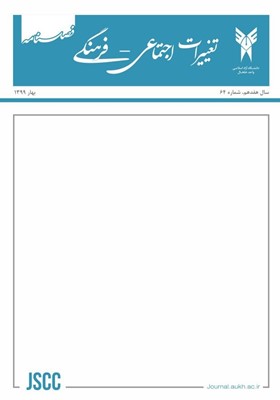مطالعه ی جامعه شناختی فرهنگ کار سازمانی و اثرات آن بر ارتقاء بهره وری کارکنان دانشگاه های دولتی شهرستان سبزوار
محورهای موضوعی : خانوادهمهدی مرادی 1 * , علیرضا کلدی 2 * , سید محمد سیدمیرزایی 3
1 - دانشجوی دکتری جامعه شناسی، واحد علوم و تحقیقات، دانشگاه آزاد اسلامی، تهران، ایران.
2 - استاد گروه جامعه شناسی، دانشکده اجتماعی، دانشگاه تهران، ایران.
3 - استاد گروه جامعه شناسی، واحد علوم وتحقیقات، دانشگاه آزاد اسلامی، تهران، ایران.
کلید واژه: بهره وری, کارکنان اداری, دانشگاه های دولتی, واژه های کلیدی: فرهنگ کار,
چکیده مقاله :
توسعه فرهنگ کار مطلوب سازمانی، در سازمانهای موفق بستگی به توانمندی و خلاقیت افراد برای مشارکت فعالانه در اقدامات و مدیریت صحیح فرهنگ کار دارد. هدف این پژوهش مطالعه ی جامعه شناختی فرهنگ کار و اثرات آن بر ارتقاء بهره وری کارکنان اداری دانشگاه های دولتی شهرستان سبزوار می باشد. روش تحقیق بر اساس رهیافت علمی و از نوع پیمایشی است و از پرسشنامه برای جمع آوری اطلاعات استفاده شده است. نمونه آماری بر اساس فرمول کوکران و جدول مورگان 205 نفر محاسبه شده است. نتایج حاکی از آن است که بین مولفههای فرهنگ کار با هر یک از مولفههای بهرهوری کارکنان، رابطه مثبت و معنی داری وجود دارد. در بین مولفههای فرهنگ کار، بعد سازمانی، با ضریب همبستگی 754/0، قوی ترین و بعد اقتصادی، با ضریب همبستگی 484/0، ضعیف ترین رابطه را با فرهنگ کار داشته و در بین مؤلفه های بهرهوری کارکنان، بعد مشارکت، با ضریب همبستگی 805/0، قوی ترین و بعد تعهد سازمانی، با ضریب همبستگی 557/0، ضعیف ترین رابطه را با بهره وری کارکنان داشته است. همچنین بر اساس ضریب بتای رگرسیون، مجموع ابعاد فرهنگ کار 68 درصد از واریانس بهره وری کارکنان را تبیین میکنند.
The development of a desirable organizational work culture in successful organizations depends on the ability and creativity of individuals to actively participate in the proper management of the work culture. The purpose of this research is to study the sociological study of organizational work culture and its effects on the productivity of administrative staff of public universities in Sabzevar. The research method is based on a scientific approach and survey type and a questionnaire is used to collect information. The statistical sample is calculated based on the Cochran formula and the Morgan table of 205 people. The results indicate that there is a positive and significant relationship between the components of work culture with each of the components of employee productivity. Among the components of the work culture, organizational dimension, with the correlation coefficient of 0.754, the strongest and economic demension, with a correlation coefficient of 0.448, had the weakest relation with the work culture. Among the components of employee productivity, the partnership demension, with the highest correlation coefficient of 0.855, and the strongest organizational commitment, with a correlation coefficient of 0.557, had the weakest relationship with employee productivity. Also, based on the beta coefficient of regression, the total demensions of work culture explain 68 percent of the variance in employee productivity.
_||_

